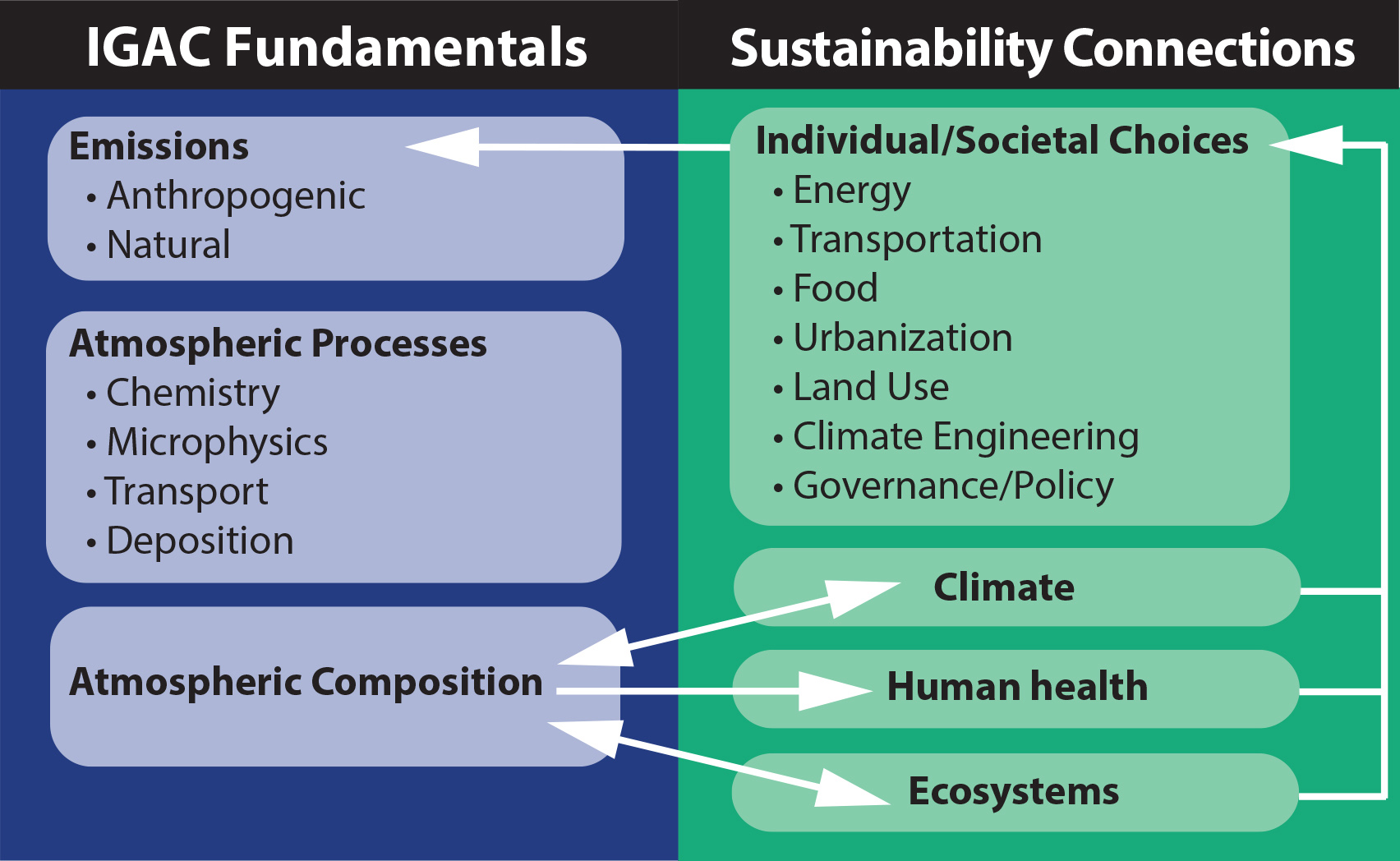Mission
The atmosphere is the integrator of the Earth system. Human emissions of pollutants and long-lived greenhouse gases into the atmosphere have caused dramatic transformations of the planet, altering air quality, climate and nutrient flows in every ecosystem. Understanding the global atmosphere requires an international network of scientists providing intellectual leadership in areas of atmospheric chemistry that need to be addressed, promoted and would benefit from research across disciplines and geographical boundaries. Acknowledgement of this need led to the formation of the International Global Atmospheric Chemistry (IGAC) Project in 1990. IGAC currently operates under the umbrella of Future Earth and is jointly sponsored by the international Commission on Atmospheric Chemistry and Global Pollution (iCACGP), a commission of IAMAS-IUGG.
IGAC’s mission is to facilitate atmospheric chemistry research towards a sustainable world. This is achieved through IGAC’s four focal activities: advancing knowledge, fostering community, building capacity, and engaging society.
 Advancing Knowledge
Advancing Knowledge
IGAC provides a framework for scientific experts to convene at the international level, identify knowledge gaps, and organize strategies to address them through topical activities that evolve with the state of knowledge.
This is achieved by . . .
- creating a forum to build common awareness on issues of regional and global interest;
- sponsoring science-focused activities organized and led from the bottom up;
- creating, managing, and supporting regional or project-based working groups;
- publishing scoping, synthesis, and review articles;
- providing a vision on knowledge gaps;
- initiating workshops to tackle key challenges as they emerge;
- advocating for balance across all fields of atmospheric chemistry research necessary to achieve a better understanding.
 Fostering Community
Fostering Community
IGAC fosters collaborations across geographical boundaries, tackling shared challenges, enabling understanding of regional differences, and connecting curiosity-driven science to applied research.
This is achieved by . . .
- hosting biennial science conferences and topical activity meetings;
- proposing both dedicated and ad-hoc sessions at other international conferences;
- providing networking opportunities for early career scientists;
- supporting intra-region networking through regional working groups;
- promoting a diverse atmospheric chemistry community that is fully inclusive.
 Building Capacity
Building Capacity
IGAC supports equitable sharing of knowledge and resources to empower the current and next generation of researchers and scientific leaders.
- regional working groups to develop leaders, identify priorities, and organize regional scientific efforts;
- creating opportunities to exchange experiences and ideas among regional working groups during IGAC conferences and events;
- supporting participation of early career scientists in IGAC-sponsored activities and events;
- providing a framework for the development of early career scientists (i.e., the Early Career Short Course);
- facilitating the rise of new activities to address current and upcoming challenges through its bottom-up structure.
 Engaging Society
Engaging Society
IGAC aspires to work with partners to synthesize and convey the relevance of atmospheric chemistry and to promote dialogues for translating knowledge into action.
We envision this will be achieved by . . .
- increasing participation in conferences intended to reach the broader community needed to address sustainability issues;
- open dialogues and new routes for exchanges with social scientists, health sciences, humanities, and various stakeholders from policy, business and civil sectors;
- raising awareness, in society, about the changing composition of the atmosphere and potential impacts of these changes
- identifying collaborations with indigenous and local communities that have experiences relevant to issues related to atmospheric chemistry
IGAC's Vision is to ensure collaboration and balance across all atmospheric chemistry disciplines to fully understand atmospheric processes, to interact with other fields of science relating to atmospheric processes, and to engage with policy makers, stakeholders, and society on sustainability.
